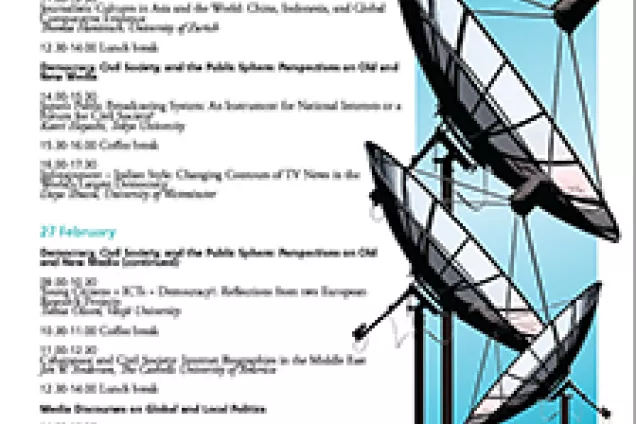Focus Asia 2009
26-27 February & 12-13 November
Media Cultures and Politics in Asia and Beyond
This 10th Focus Asia event brought together leading media scholars from around the world who discussed media in Asia and beyond. The media in Asia are a relatively new field of academic research and offers important new perspectives on central questions in the study of the media. But media developments in Asia are not only of academic interest as they are increasingly influencing both media consumption and public debate globally.
The relationship between media, democracy and the public sphere has been the subject of intensive debate for many years. Several of the lectures at this Focus Asia address different aspects of this relationship in different national and regional contexts. What are the relationships between political systems and media structures in different Asian societies? How are political transitions influenced by or represented in the media? What voices are heard in the Asian media and whom do they represent?
Whether new media such as the Internet will strengthen civil society and the public sphere is a hotly debated issue. The rapidly expanding use of the Internet and its impact for public debate and citizenship in societies as different as China and the Middle East is worth paying close attention to and comparing with developments in Europe. Yet it is important that we do not forget that television is still the media that reaches the largest and broadest group of people in many countries in Asia and that it therefore deserves continuing close scrutiny both to format and content.
This Focus Asia was organized by the Centre for East and South-East Asian Studies in cooperation with the Centre for Middle Eastern Studies, and the Swedish South Asian Studies Network (SASNET).
Contemporary Issues in Taiwanese Innovation and Industrial Policy
All over the world governments are trying create flourishing clusters and dynamic business networks based on science and innovation. Although these attempts have been strongly supported by governments there have been few examples of successful policy created high-tech business regions and industries. However, one of the few examples often mentioned where this has succeeded is Taiwan where we in the last few decades seen a strong policy support of the development of industries related electronics and ICT.
Since the mid-1990s, in the traces of these industries, the Taiwanese government has also put an increasing emphasis of the creation of new industries related to new advanced knowledge, such as for example biotechnology. The development of biotechnology has however hitherto been a disappointment, for instance in terms of the income generated and number of new technologies produced. This observation directs us towards issues such as the need to scrutinize past developments and what expectations has been brought forward but also to look at what lies ahead.
The 11th Focus Asia discussed the current Taiwanese economic transformation and innovation and industrial policy. What will be focus is Taiwan’s contemporary ambition to move into a knowledge-based economy. This was discussed through various theoretical and empirical perspectives. The scope of this workshop can roughly be divided into the study of the diffusion of innovation and the embeddedness of innovation in a Taiwanese context.

Focus Asia February 2009


